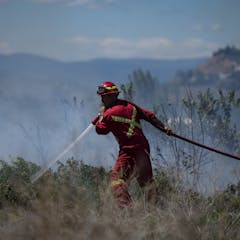
Artículos sobre Wildfires
Mostrando 1 - 20 de 378 artículos

Homeowners insurance is so expensive that some people are going without it.

Satellites used satellite sensors to identify the 0.01% ‘most extreme’ fires worldwide.

The record-breaking and destructive forest fires of the summer of 2023 made headlines. But how did they affect the millions of lakes in the burned catchment areas?

An analysis of 88 million wildfire observations over the past 21 years shows a strong increase in the frequency and intensity of the most extreme fires around the world.

Our work shows they may be caused by spontaneous combustion triggered by sudden climate change.

There’s a strong case to be made for private landholders to conduct their own cool burns, for dual purposes of reducing fuel load and restoring the ecology.

Canada’s 2024 wildfire season will likely be even more severe than the unprecedented fires of 2023. Being aware of the risks, and taking some sensible precautions, can help keep you safe.

Are wombats the accidental heroes of the Australian bush? After the Black Summer bushfires, we set up 56 cameras to capture animal activity in areas with and without wombat burrows to find out.

States could be in for another summer of unhealthy wildfire smoke as ‘zombie fires’ resurface in western Canada and more blazes break out in the dry conditions.

As wildfire season approaches, Canadians —especially northerners and Indigenous Peoples — are being let down by Meta and their government when they need them most.

The 2023 megafires burnt more than 84 million hectares of desert and savannah in northern Australia. That’s larger than the whole of NSW, or more than three times size of the UK.

We compiled maps of bushfires and prescribed burns in southern Australia from 1980 to 2021 to see how fire activity is changing habitat for 129 threatened species such as mountain pygmy possums.

In the lead-up to the 2024 federal budget, there was hope for investments in water management and water-related infrastructure. Those hopes were misplaced.

Turning off power is a last-ditch strategy for utilities to reduce the risk that their systems could spark wildfires. In most states, deciding whether to take that step is up to utilities.

Marsupial rescue, rehabilitation and release statistics from New South Wales and Kangaroo Island during Black Summer fires reveal poor survival rates, despite the courageous efforts of volunteers.

A new study offers a rare window into the hidden effects of aggressive fire suppression that go beyond fuel accumulation. The practice may even change the course of forest evolution.

Declining precipitation, climate change and governance failures will drive water flow scarcity in 2024 with serious implications across Western Canada.

Scientists have been debating the start of the Anthropocene Epoch for 15 years. I was part of those discussions, and I agree with the vote rejecting it.

Australia’s approach to estimating bushfire emissions is credible and sophisticated. But it must be refined as technology improves and the climate changes.

Census data and research show all things are not equal in disaster displacement, as 2 experts in disaster recovery explain.
